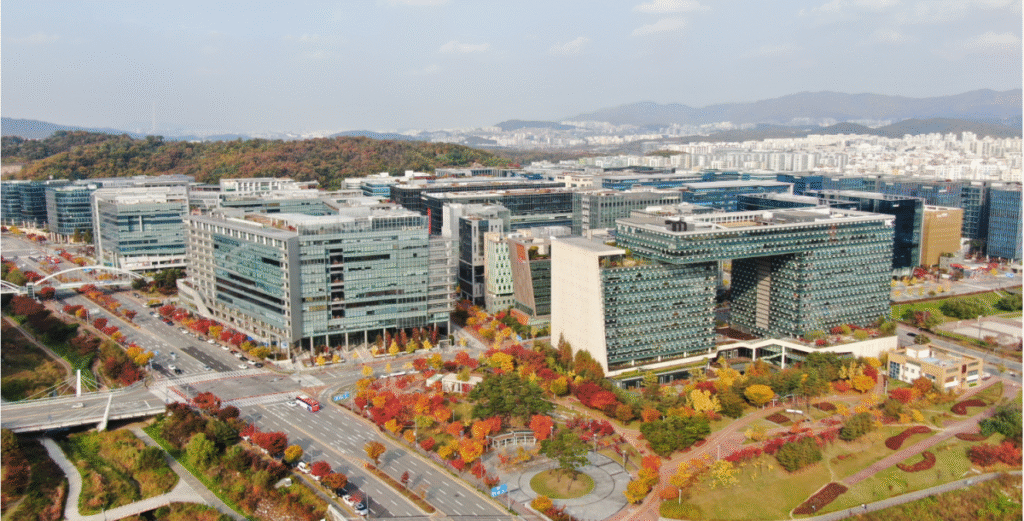Just south of Seoul, in the city of Seongnam, sits what many call the “Silicon Valley of South Korea”: the sprawling tech complex known as Pangyo Techno Valley (PTV), which is just a 15-minute subway ride from Gangnam, better known for its luxury boutiques, K-pop agencies, and neon nightlife in Seoul.
Since launching in 2011, the 661,000-square-meter development has evolved into one of the country’s most significant innovation hubs. It’s home to more than 1,800 startups, research centers, and global tech firms, all packed into a district that feels more like a laboratory for South Korea’s future than a suburb of Seoul.
Big names are everywhere in Pangyo Techno Valley, including Naver, often described as Korea’s Google, and Kakao, the country’s everything-app. Gaming powerhouses Nexon and NCSoft anchor the district alongside industrial heavyweights like shipbuilder HD Hyundai and cybersecurity pioneer AhnLab. Samsung Electronics, semiconductor giant SK Hynix, and Hyundai’s autonomous vehicle division 42dot all maintain significant presences. Yet despite this concentration of tech talent and capital, industry insiders question whether Pangyo truly deserves its Silicon Valley comparison.
“Pangyo is absolutely Korea’s most concentrated hub for software, gaming, platforms, and AI,” says Hyoungchul Choi, CEO of Portologics, who founded his company there five years ago. But he’s skeptical of the Silicon Valley label. “The nickname is convenient, but we shouldn’t overstate our global influence. Silicon Valley isn’t just about density—it’s built on decades of international capital flows, risk-taking culture, and its ability to attract talent worldwide. We’re not there yet.”
The statistics back up this more modest assessment. As of a year ago, Pangyo Techno Valley was predominantly home to smaller players, with approximately 91.5% of its companies being small and mid-size businesses, with big tech accounting for just 3.6% and the remaining 4.9% made up of public or government organizations, according to PTV’s official website.
Janice Sa, a principal at Z Venture Capital, who has been working in Pangyo for more than a decade, sees the district’s influence waning.
“With giants like Kakao, Naver, Nexon, and NCSoft all in one place,” the PTV’s title of Korea’s Silicon Valley “still makes sense,” she says. But compared to ten years ago, the district doesn’t feel quite as dominant as the country’s go-to tech hub, Sa said. “Back then, startups were flocking to Pangyo. Today, many are heading back to Gangnam [in Seoul].” The reasons, she added, boil down to talent and capital. “Young developers and engineers still gravitate toward Gangnam, and most venture capital firms are packed along Teheran Street, the city’s main tech corridor lined with startups, big tech offices, and investors. For hiring and fundraising, that makes Gangnam the easier choice.”
Techcrunch event
San Francisco
|
October 27-29, 2025
That exodus reflects a broader challenge. For big corporations tied to long-term leases with tax incentives, being in Pangyo isn’t much of an issue, Sa noted. But for startups competing for talent, the location can be a greater challenge. Pangyo might be only a short ride from Gangnam, but it’s still in Gyeonggi Province, not Seoul. And because government support programs are often tied to local jurisdictions, Seoul ends up with more active startup infrastructure and stronger global initiatives.
An insider at a Pangyo-based tech firm, who asked not to be named, shared a similar perspective. With so many tech companies in one place, Pangyo has developed a culture that feels naturally geared toward the industry. “When you’re working in tech here, collaboration comes easier—everyone’s just around the corner,” he said. But Seoul is “more diverse. For example, Yeouido is Korea’s Wall Street, perfect for fintechs, while Gangnam draws startups of every kind.”
The bigger question is whether Korean startups, regardless of location, can compete globally. Both government and private investors are pushing companies to expand internationally as the domestic market saturates. Yet breakthrough success stories remain elusive.
A Kakao Ventures investor highlights cultural differences that may explain the gap. “American startups tend to succeed — and fail — much faster, which fuels constant experimentation and a high rate of talent movement. Speed is a startup’s greatest strength, so I try to have open conversations with founders about how to turn failure into opportunity,” the investor said.
Storytelling is another challenge, says this investor. “Many Korean founders are sharp on numbers and strategy, but stumble on a simpler question: What’s your story? Business is still about people connecting with people. Without a clear, authentic narrative of why you and your team are the right ones, it’s hard to stand out. And because so many already bring strong skills to the table, that personal story becomes even more important,” this person said.
Choi sees reason for optimism despite the challenges. The scene blends the grit of scrappy founders with the steady influence of big Korean tech companies, where stability and benefits still matter. “Unlike in the U.S., where founders often leap into risk and pivot fast, startups here tend to balance ambition with discipline—building proof at home before going abroad. The outcome is dependable engineering, but without the same ‘move fast, break things’ energy that defines Silicon Valley.”
Pangyo is also moving beyond gaming and platforms into AI, biotech, and deep tech, with governments investing in startup campuses and scaling programs, Choi observed.
The real test now is less about local growth and more about proving global success—unicorns, cross-border exits, and steady inflows of talent, he said.
“What holds Korean startups back from going global? Three key factors are the home market is small size, weaker global investor ties, and language or regulatory hurdles that create additional friction. Breaking through takes more than ambition; it needs early global partners, deliberate go-to-market resources, and leaders who think cross-border from day one,” Choi said.
Yet a fourth factor — their ability to tell compelling stories to the world — may also prove to be the biggest difference between remaining a regional tech hub and becoming a true global innovation center.


